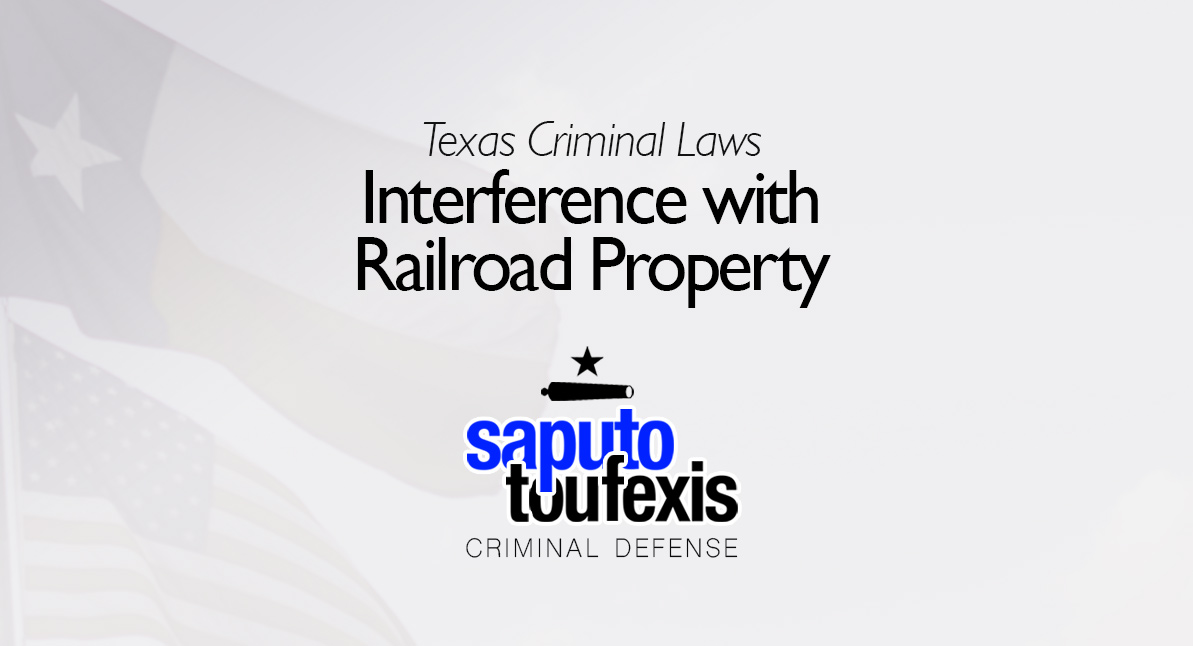The Texas Interference with Railroad Property law gives police the right to arrest you if they believe you threw an object at or discharged a firearm at a train or train equipment. You can also be arrested under this law if the police believe you trespassed on railroad property or caused the derailment of a train.
FAQs about the
Interference with Railroad Property law in Texas
- What is the current Texas law about Interference with Railroad Property?
- What is the penalty for a Texas Interference with Railroad Property offense?
- How can I be charged with an Interference with Railroad Property offense in Texas?
- What is the statute of limitations for Interference with Railroad Property in Texas?
- Can you get probation for Interference with Railroad Property in Texas?
- What level of crime is Interference with Railroad Property in Texas?
The Texas legislature codified this criminal offense in Texas Penal Code Section 28.07. The legislature did not update this law in 2025. In fact, this law has not been amended since 2015.
The Penal Code classifies the Texas Interference with Railroad Property law under Title 7 “Offenses Against Property,” Chapter 28 “Arson, Criminal Mischief, and Other Property Damage or Destruction.” Crimes under this chapter cover a wide range of offenses that focus on actions taken against property belong to other people. These offenses include both destructive actions and aesthetic changes. Learn more about the Texas offense of Interference with Railroad Property below.
What is the current Texas law about Interference with Railroad Property?
AV Preeminent Texas lawyer Paul Saputo provides the current law defining Interference with Railroad Property in Penal Code Section §28.07, as follows:[1]
(b) A person commits an offense if the person:
(1) throws an object or discharges a firearm or weapon at a train or rail-mounted work equipment; or
(2) without the effective consent of the owner:
(A) enters or remains on railroad property, knowing that it is railroad property;
(B) tampers with railroad property;
(C) places an obstruction on a railroad track or right-of-way; or
(D) causes in any manner the derailment of a train, railroad car, or other railroad property that moves on tracks.
What is the penalty for a Texas Interference with Railroad Property offense?
A violation of subsection (b) of the Abandoning or Endangering Child, Elderly Individual, or Disabled Individual offense is classfiied as a state jail felony, punishable by 6 months to 2 years in state jail and a fine, if the person is found to have abandoned the person with the intent to return for them or a third degree felony, punishable by 2-10 years in prison and a fine, if the state finds there was no intent to return for the person.[2] However, the punishment can be enhanced to a second degree felony if there is a finding that the abandonment put the child, eldery person or disabled person in imminent danger of death, bodily injury, or physical or mental impairment.[3] A second degree felony is punishable by 2-20 years in prison and a fine.
A conviction for subsection (c) Endangering a Child is punished as a state jail felony.[4]
How can I be charged with an Interference with Railroad Property offense in Texas?
You can be charged with Interference with Railroad Property in Texas if the state’s attorneys believe that each of the elements of §28.07(b) as described in the section above have been met.
What is the statute of limitations for Interference with Railroad Property in Texas?
Misdemeanor level Interference with Railroad Property charges have a two-year limitations period.[5] Felony level offenses follow the default felony limitations period rule, which specifies a three-year limitations period.[6]
Can you get probation for Interference with Railroad Property in Texas?
The Texas Code of Criminal Procedure allows both judges and juries to grant probation for Interference with Railroad Property, and judges are also allowed to accept deferred adjudication plea deals.[7]
Note, however, that no matter the offense, neither judges nor juries may recommend community supervision for any suspended sentence of over 10 years.[8] Also, judges may not grant community supervision after a conviction if (1) the defendant used or exhibited a deadly weapon during the commission of the felony or immediate flight thereafter and (2) the defendant used or exhibited the deadly weapon himself or was a party to the offense and knew that a deadly weapon would be used or exhibited.[9]
What level of crime is Interference with Railroad Property in Texas?
The Penal Code classification of the punishment for Interference with Railroad Property ranges from a Class C misdemeanor to a first degree felony, depending on the circumstances.
Learn more about the penalty range for this offense in the section above.
Legal References:
^1. Texas Penal Code §28.07. This law is current as of 2025.^2. Texas Penal Code §22.041(d)^3. Texas Penal Code §22.041(e)^4. Texas Penal Code §22.041(f)^5. Code of Criminal Procedure 12.02(a)^6. See Code of Criminal Procedure 12.01(11)^7. See Chapter 42A, Texas Code of Criminal Procedure, Art. 42A.054, Art. 42A.056, Art. 42A.102^8. Art. 42A.053(c), Texas Code of Criminal Procedure^9. Art. 42A.054(b), Texas Code of Criminal Procedure










